
From Internet Sensation to Internet Villain
Once upon a time, the internet couldn’t get enough of a man sprinkling salt with a flick of his wrist. His sunglasses, his tight white T-shirt, and his smug half-smile made him an overnight meme legend. Nusret Gökçe, better known as Salt Bae, became a global icon almost instantly. His videos of slicing meat and sprinkling salt like a culinary rockstar drew millions of views, celebrity visits, and a flood of business opportunities.
But fame is a fragile currency. Fast forward to today, and the very same man is the subject of widespread internet hatred. Once hailed as the coolest butcher alive, Salt Bae is now mocked for overpriced steaks, poor restaurant experiences, forced celebrity moments, and a personality that many now find cringeworthy.
This is the story of how the internet built him up — and then tore him down.
The Origin Story — A Butcher’s Dream
Long before the salt sprinkle that made him famous, Nusret Gökçe was born in 1983 in Erzurum, Turkey, into a poor family. His father was a mineworker, and his family’s financial struggles forced him to leave school early. He began working as a butcher’s apprentice in Istanbul at just 13 years old, learning the art of cutting and preparing meat.
His early years were defined by hard work, relentless ambition, and an obsession with perfection. Gökçe didn’t just want to sell meat — he wanted to perform with it. Inspired by both Turkish tradition and Western-style steakhouse theatrics, he envisioned creating a restaurant where dining was as much a spectacle as it was a meal.
By his early 30s, Gökçe had opened Nusr-Et Steakhouse in Istanbul. Business was decent, but the real turning point came in January 2017.
The Meme That Changed Everything
In early 2017, a video titled “Ottoman Steak” was uploaded to Nusr-Et’s social media accounts. In it, Salt Bae sliced a massive steak with exaggerated precision, then sprinkled salt from a height, letting it cascade down his bent arm onto the meat.
The internet went wild.
- The move was sexy, theatrical, and meme-worthy.
- Celebrities started imitating him.
- Instagram reposts pushed the video into viral territory, racking up tens of millions of views.
Almost overnight, “Salt Bae” became a household name. He went from being a niche chef in Turkey to an international brand, opening restaurants in Dubai, Miami, London, New York, and more. Everyone wanted to see the sprinkle in person.
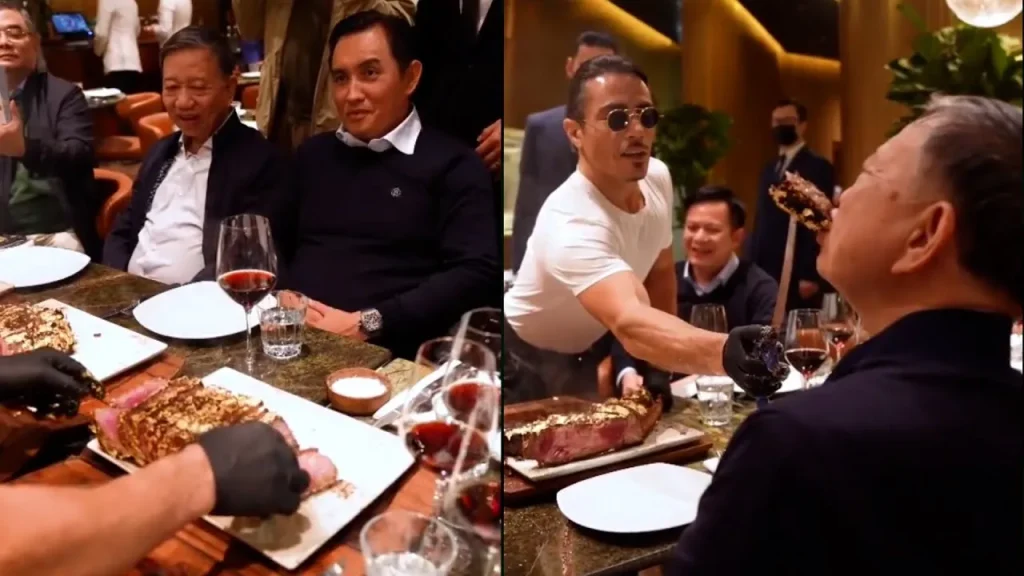
The Peak of Fame — Gold Steaks and VIP Guests
At the height of his fame, Salt Bae’s steakhouses were exclusive playgrounds for the rich and famous. His restaurants became hotspots for:
- Hollywood celebrities like Leonardo DiCaprio
- Football stars like Lionel Messi and Cristiano Ronaldo
- Politicians and royalty from around the globe
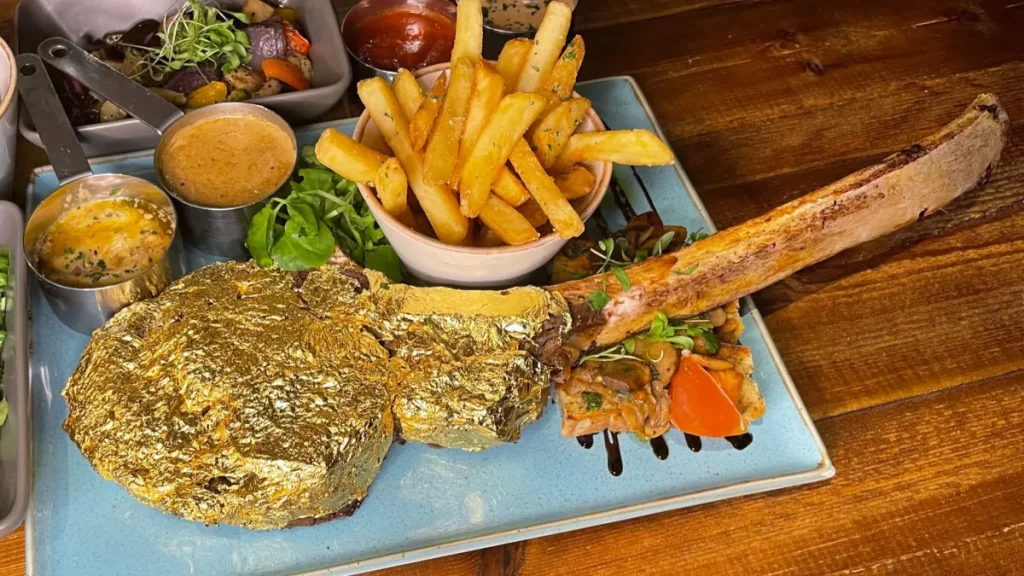
One signature menu item — the gold-covered tomahawk steak — became a viral sensation on its own. Wrapped in 24-karat gold leaf and costing over $1,000, it became a symbol of luxury excess.
Salt Bae himself would personally serve the steaks, slicing them in front of guests, feeding them by hand, and sprinkling salt with his signature flair. For a while, the internet couldn’t get enough.
The First Cracks Appear — Overpriced and Underwhelming
As Nusr-Et expanded globally, customer complaints started surfacing. Many diners began reporting that the food didn’t live up to the hype.
Common complaints included:
- Steaks that were overcooked or poorly seasoned
- Prices that felt insanely inflated for the quality provided
- Staff focusing more on filming videos than delivering service
- Feeling like they were paying more for Salt Bae’s brand than for the food itself
Viral tweets and TikToks began exposing bills totaling thousands of dollars for meals that left customers hungry and disappointed. The gold steaks, once a sign of opulence, became a symbol of ridiculousness.
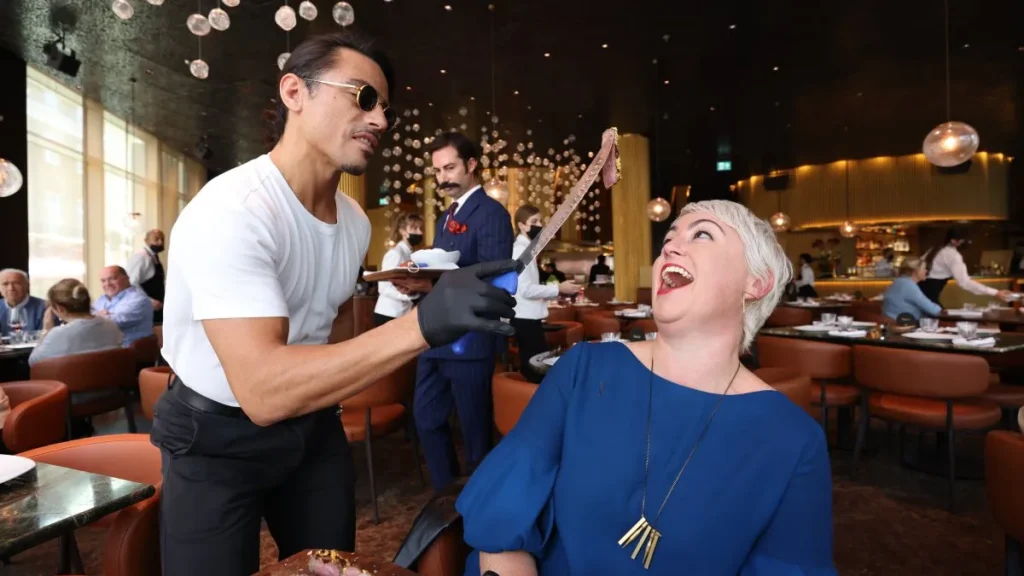
Celebrity Encounters Turn Awkward
Salt Bae’s marketing strategy heavily relied on celebrity appearances. But over time, many of these encounters began to feel forced, awkward, or downright uncomfortable.
One infamous moment came during the 2022 FIFA World Cup Final. After Argentina’s victory, Salt Bae somehow made his way onto the pitch, attempting to pose with Lionel Messi and other players. Messi’s body language screamed discomfort, and the clip went viral for all the wrong reasons.
This incident painted Salt Bae as someone desperate to cling to fame, willing to crash private moments for publicity. FIFA later reprimanded him, and the backlash was intense.
The Internet Turns Against Him
Once the novelty wore off, the internet’s love for Salt Bae began to mutate into mockery. Memes that once celebrated him now ridiculed his pretentiousness.
Several factors fueled the hate:
- Perceived arrogance — His smug expressions and constant self-promotion turned fans off.
- Bad reviews — People began to share brutally honest dining experiences online.
- Social media saturation — The sprinkle routine felt repetitive and overused.
- Out-of-touch luxury — Gold steaks in a time of global economic hardship made him seem disconnected from reality.
His Instagram, once flooded with millions of likes, saw a massive engagement drop. Many accused him of buying followers to maintain an illusion of popularity.
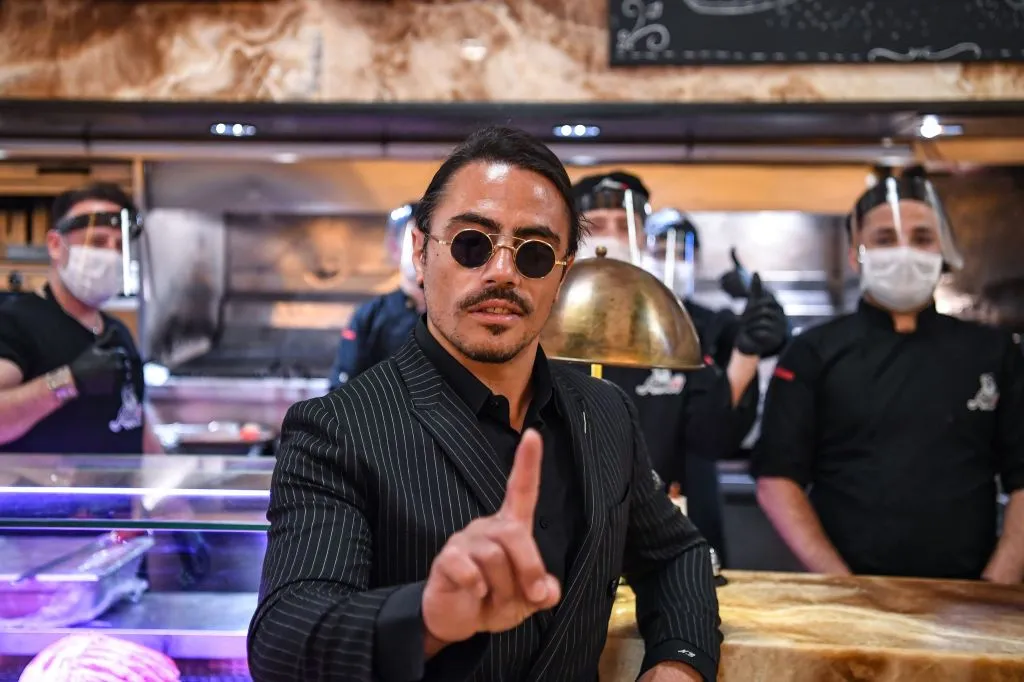
PR Disasters and Lawsuits
Adding to his downfall were a series of legal and PR nightmares:
- Former employees in the U.S. and U.K. accused Nusr-Et restaurants of unpaid overtime and unfair labor practices.
- Customers filed lawsuits claiming overcharging and hidden fees.
- News outlets began investigating health and safety violations in some of his locations.
Instead of addressing these issues head-on, Salt Bae doubled down on his lavish persona — posting more gold steaks, luxury cars, and celebrity selfies, further alienating the public.

The Meme That Aged Badly
Salt Bae’s biggest strength — his viral meme persona — eventually became his biggest weakness. The sprinkle, once fresh and exciting, became a tired gimmick.
clinging to the same trick.
The Psychology Behind the Hate
Why did the internet turn on Salt Bae so harshly? Psychologists and social media experts point to a few reasons:In the fast-moving world of internet culture, memes are outdated by 2022. Without evolving his brand, Salt Bae became a relic of a past internet era, quickly. What was cool in 2017 felt c
- Overexposure — The more we saw him, the less special he felt.
- Expectation vs. reality gap — People’s dining experiences didn’t match the hype.
- Resentment toward flaunting wealth — In times of economic struggle, gold steaks felt insulting.
- Loss of authenticity — Salt Bae’s rise was organic, but his later fame felt manufactured.
This shift from authentic performer to corporate showman sealed his fate.
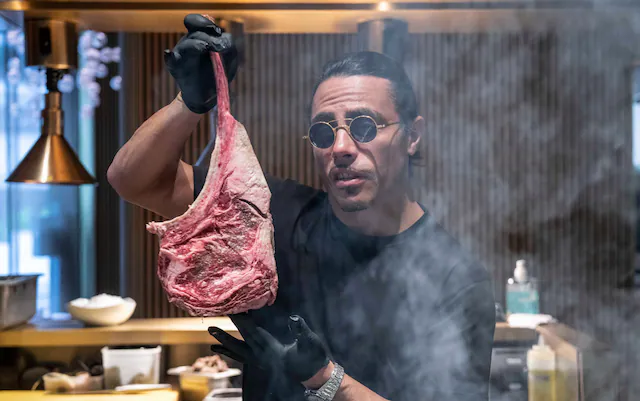
The Fall of an Internet King
Today, Salt Bae’s name is often brought up in “fallen celebrity” lists. His restaurants still operate, but the buzz has faded. Social media engagement is down, the press coverage is often negative, and the internet largely sees him as a cautionary tale of viral fame gone wrong.
Lessons from Salt Bae’s Downfall
- Viral fame is fleeting — Without evolving, even the most beloved internet personalities fade.
- Authenticity matters — Audiences can sense when you’re faking it.
- Luxury must match value — Overpricing without delivering quality breeds resentment.
- Don’t force celebrity moments — Let them happen naturally.

Final Word: From Sprinkles to Silence
Salt Bae’s journey is a modern-day parable about the double-edged sword of internet fame. He went from a humble butcher to a global superstar in the blink of an eye. But in his quest to maintain that fame, he became a caricature of himself.
Today, the sprinkle still exists — but the magic is gone. And the internet, once his biggest cheerleader, now watches from a distance, shaking its head.


